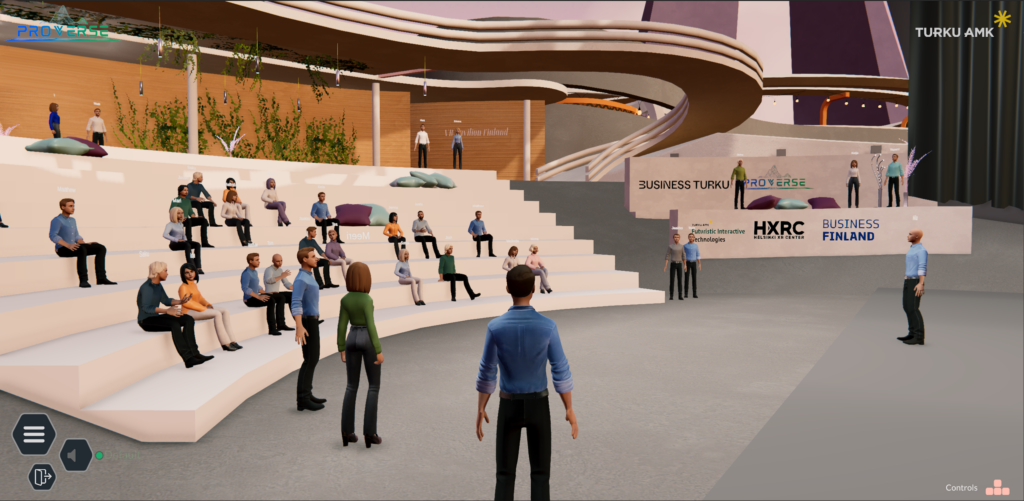Time: Wed 6.3. 12:00-4.00PM
Location: Auditorium President BioCity, Tykistökatu 6, Turku (or via Visiting Centre Joki Lemminkäisenkatu 12b),
Registration: Seminar on Industrial Metaverse and Technology Enablers. Register no later than 3.3.

Why is the industrial metaverse becoming popular as the first application area? What are the main technology enablers that we plan to use in the near future?
The seminar is organized as part of the Virtual Training Certification and Necoverse projects coordinated by Turku University of Applied Sciences and Dimecc. These projects are a part of Meyer Turku’s NEcOLEAP locomotive ecosystem, which aims to develop a climate-neutral cruise ship concept by 2025. In Necoverse, new collaboration tools are being developed for the Meyer shipyard, which improve energy efficiency in training, commissioning, planning, operation, and maintenance.

Programme
12:00 Opening of The Seminar, Honorable Douglas T. Hickey, Ambassador of the United States to the Republic of Finland
12:10 Keynote: Nokia Multimedia Technologies Empowering The Metaverse, Director (Head of Multimedia Technologies) Ville-Veikko Mattila, Nokia Technologies
12:50 Objectives and Achievements in The VTC Project, Senior Advisor Timo Haavisto, Turku University of Applied Sciences
13:00 Objectives and Achievements in The Necoverse Project, Senior Advisor Merja Mäkelä, Turku University of Applied Sciences
13:10 Building The Digital Platform for Meyer, Solution Owner David Thomson, ALFRED Maritime GmbH
13:30 Nvidia Omniverse – Experiences of The First Customer Cases in Finland, Nordic Lead – Intelligent Edge Teemu Nordman, Accenture
13:50 Coffee break
14:30 NEcOLeap Veturi Ecosystem, Ecosystem Lead Ilkka Rytkölä, Meyer Turku
14:50 UWB Positioning – Enabling high accuracy indoor position in industrial metaverse solutions, CEO Tuukka Tarkiainen, Noccela
15:10 Change Management and Collaborative Design in Construction Industry, CEO Tony Lindqvist, Collaprime
15:30 Enhancing maritime training with digital technologies, Director Daniel Zhang, Centre of Excellence in Maritime Safety (CEMS)
15:50 Digital Immersive Life, Program Director Sanni Siltanen, Business Finland
16:10 Closing Remarks, Mika Luimula, Turku University of Applied Sciences
Demo session
Time: Wed 6.3. 4.30– 6.30PM
Location: Showroom (Visiting Center Joki), Lemminkäisenkatu 12b, 20520 Turku
Demo Session – sparkling wine, snacks and demonstrations
Projects
Necoverse
The Necoverse project aims at the development and utilization of new training, planning and operating environments in shipbuilding. The main part of the project is a metaverse, which creates shared interactive three-dimensional experiences with the help of virtual reality, augmented reality and videos. The virtual shipyard environment operating in the industrial metaverse offers new opportunities for many people, from interior designers to trainers of shipyard workers.
The companies dSign Vertti Kivi & Co, Finpeda, Hollinki, Kiwa Inspecta, Lingsoft and Meyer Turku, as well as the research institutes Aalto University, Turku University of Applied Sciences and VTT, are participating in this two-year 5.5 million euro Necoverse project, coordinated by Turku University of Applied Sciences and industry’s co-creation company DIMECC. The project is financed by Business Finland, research organizations and partner companies.
VTC
The goal of VTC project is to create a harmonized certification platform for training competencies virtually. When competence and skills can be verified virtually and remotely, certified competence cards can be linked to individuals using identity verification. The competence can therefore be verified regardless of the location.
The companies Kiwa, ADE, Desigence, OEP, and TTS, as well as the research institutes Turku University of Applied Sciences and University of Turku, are participating in this two-year 3.0 million euro VTC project, coordinated by Turku University of Applied Sciences. The project is financed by Business Finland, research organizations and partner companies.

